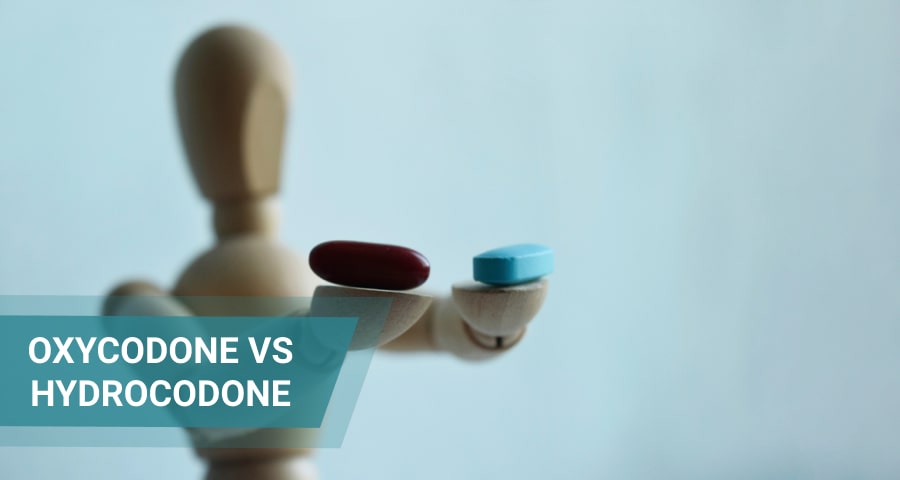
People respond to pain differently. Mild pain doesn’t always need treatment, but many people seek relief for severe or continuous pain. Hydrocodone and Oxycodone are two common prescription painkillers used when over-the-counter medications don’t ease the pain in individuals. While both are effective as analgesics, patients can easily misuse these opioids. Learn about the proper use of Hydrocodone vs. Oxycodone and any difference between them.
Table Of Contents:
- What Are Oxycodone and Hydrocodone?
- What Are The Uses of Hydrocodone and Oxycodone?
- Which One Is More Effective: Oxycodone vs. Hydrocodone?
- What Are Their Side Effects?
- What Are The Warnings For These Drugs?
- Which One Is More Likely to be Abused: Hydrocodone vs. Oxycodone?
- What Are Their Different Forms and Doses?
- Which One Should Be Used?

What Are Oxycodone and Hydrocodone?
Hydrocodone (HC) and Oxycodone (OC) are semi-synthetic opioid medications used to manage both short- and long-term pain resulting from a range of conditions, such as injury, surgery, cancer, arthritis, and chronic pain illnesses, and more. They both belong to the class of medicines called opioid analgesics. These are Schedule II drugs, which indicates that they are medically beneficial but have a high potential for addiction. Therefore, people should not use the analgesic drug on an as-needed basis to manage pain.

These narcotic analgesics work by changing how the central nervous system (CNS) and brain respond to pain. Both medications work by binding to certain pain receptors, including mu-opioid receptors (MOR) found in the CNS. Once they attach to these receptors, pain signals get weakened or blocked altogether. In addition, MOR plays a part in the suppression of the cough reflex.
Uses of Hydrocodone and Oxycodone
Both drugs are used to relieve mild to severe pain in individuals who need long-term pain medication and haven’t responded to alternative treatment options. These medications are only used as prescribed by medical professionals for the treatment of conditions, including chronic cough, cancer-related and osteoarthritis pain, and more.
Oxycodone drug comes as both immediate and 12-hour release medications, whereas Hydrocodone is used as an instant pain reliever in its most common form available. While OC only works for pain treatment, HC suppresses the cough reflex and relieves pain due to coughing when combined with other medications.
Which One Is More Effective?
Both medications are strong painkillers, and they are incredibly effective at managing pain in individuals. In the Placebo Effect study, researchers found that participants experienced equal pain relief 30 and 60 minutes after taking medications and saw similar side effects. But those who took HC experienced constipation more often than participants who had OC.
The study comparing the efficacy of oral analgesics found no significant difference between Hydrocodone and Oxycodone when combined with acetaminophen (APAP) to ease acute musculoskeletal pain. Nearly 60% of participants in both groups reported a significant reduction in discomfort.
Only the healthcare center professionals can determine which drug is more effective between Oxycodone vs. Hydrocodone for an individual, depending upon one’s medical condition, history, and other current medications.
Is Oxycodone Stronger Than Hydrocodone?
Is Oxycodone stronger than Hydrocodone? To some researchers and healthcare professionals, OC is more potent than HC. In addition, according to the Drug Alcohol and Dependence study, the combination of Oxycodone APAP was 1.5x stronger than the combination of Hydrocodone and APAP in terms of pain treatment.
Side Effects
Since both medications belong to the opioid class of drugs and are chemically related, most of their common side effects are similar.
The Side Effects of OxyContin vs. Hydrocodone May Include the Following:
- Drowsiness
- Dizziness
- Dry mouth
- Headache
- Stomach pain
- Slow/shallow breathing
- Tiredness
- Nausea and vomiting
- Motor skill impairment
- Itching
- Swelling around mouth
- Irregular heartbeat
But the more severe side effects cause a difference between Hydrocodone and Oxycodone. The latter is more likely to cause depression, insomnia, gastritis, seizures, impotence, and urinary retention, while HC will cause more stomach pain, constipation, tremor, and upper respiratory tract infections.
Warnings
Both are powerful narcotic drugs that people must not use without consulting with the doctor or pharmacist. Patients should also provide detailed information, including their medical history and any pre-existing health problems they have.
These Drugs Share Similar Warnings, Which Are as Follows:
- Individuals having asthma or breathing difficulties may need to avoid these pain medications altogether.
- People who are constipated must avoid taking these medications, especially the HC drug, because of the risk of increased constipation.
- Individuals with liver or kidney disease must not take these medications as they can make these conditions worse.
- Taking these narcotics with alcohol could be dangerous as this combination can cause excessive drowsiness and damage the liver. If this happens, one must call the poison control center instantly.
- Pregnant women must consult the healthcare center professional and provide information as taking these drugs may increase the risk of congenital disabilities.
- Breastfeeding women must also avoid taking these opioids as they can pass through the breast milk and eventually harm the baby.
- Misuse or abuse of either of these medicines by chewing or injecting the dissolved product can result in poisoning, addiction, overdose, or even death.
Addictive Potential
As per many surveys, opioid misuse and addiction remain a severe public health problem in various big countries, including the US, Canada, and Mexico. Almost 128 Americans lose their lives every day from opioid overdose, according to the Centers for Disease Control and Prevention (CDC). Over 16,000 people die yearly, which involves overdoses of opioid drugs mainly containing OC or HC, outnumbering those including cocaine and heroin combined.

When it comes to the addictive potential of Hydrocodone vs. Oxycodone, the latter was found to be more likely to be abused, as per the review of different clinical studies. Many OC products are 100% pure, while HC is frequently combined with other medications, making it less attractive among active abusers. Another reason is the wider distribution and consumption of Oxycodone globally than HC, which is only used in America.
Forms And Doses
Hydrocodone and its branded versions can be found as an oral tablet and an oral solution. The tablets come in strengths starting from 5mg to 50mg.
OxyContin pills come in capsules with strengths 5mg, 10mg, and 20mg. The liquid form is available in 5mg in 5ml, 10mg in 1ml of liquid. Slow-release tablets are available in strengths from 5mg to 120mg.
Choosing Between Oxycodone vs. Hydrocodone
In studies, both drugs have the same effectiveness for acute and chronic pain treatment and similar side effects. They are prescription medications, so the selection between Oxycodone vs. Hydrocodone for an individual can be made by consulting with the healthcare provider. Depending on the patient’s medical history, the doctor can weigh the advantages and disadvantages of these opioids.
When it comes to the potency of OxyContin vs. Hydrocodone, some researchers and healthcare professionals find the first one stronger. So, in that scenario, the doctor may prefer to begin with smaller doses of OC to see the body’s reaction to this medication. If the first drug doesn’t work or causes harm rather than help, the patient can provide detailed information to the doctor to find something that works.
In case of misuse, one must visit the nearest rehab center to seek immediate help.
Hope Without Commitment
Find the best treatment options. Call our free and confidential helpline
Most private insurances accepted
Find Drug Rehabilitation Centers Near You Anywhere In the US
Addiction Resource team has compiled an extensive list of the top drug rehabilitation facilities around the country. Use our locator tool to find the best centers near you.
Page Sources
- Medline Plus. Oxycodone. 2019. https://medlineplus.gov/druginfo/meds/a682132.html
- Medline Plus. Hydrocodone. 2019. https://medlineplus.gov/druginfo/meds/a614045.html
- Oxycodone. National Center for Biotechnology Information. PubChem Compound Database; https://pubchem.ncbi.nlm.nih.gov/compound/5284603
- Substance Abuse and Mental Health Services Administration. Oxycodone and Hydrocodone: Detection in Urine, Oral Fluid, and Blood. 2014. https://www.samhsa.gov/sites/default/files/meeting/documents/flegel-research-studies-dtab-june-2014_0.pdf
- Wightman, R., Perrone, J., Portelli, I., & Nelson, L. (2012). Likeability and abuse liability of commonly prescribed opioids. Journal of medical toxicology: official journal of the American College of Medical Toxicology, 8(4), 335–340. https://www.ncbi.nlm.nih.gov/pmc/articles/PMC3550270/
- Moradi, M., Esmaeili, S., Shoar, S., & Safari, S. (2012). Use of oxycodone in pain management. Anesthesiology and pain medicine, 1(4), 262–264. https://www.ncbi.nlm.nih.gov/pmc/articles/PMC4018705/
- Andrew Chang, M.D; David Esses, M.D; E. John Gallagher, M.D, Comparative efficacy of 4 oral analgesics for the initial management of acute musculoskeletal extremity pain, 2015. https://clinicaltrials.gov/ProvidedDocs/18/NCT02455518/Prot_SAP_000.pdf
- Zacny, J. P., & Gutierrez, S. (2009). Within-subject comparison of the psychopharmacological profiles of oral hydrocodone and oxycodone combination products in non-drug-abusing volunteers. Drug and alcohol dependence, 101(1-2), 107-114. https://pubmed.ncbi.nlm.nih.gov/19118954/
- Marco, C. A., Plewa, M. C., Buderer, N., Black, C., & Roberts, A. (2005). Comparison of oxycodone and hydrocodone for the treatment of acute pain associated with fractures: a double‐blind, randomized, controlled trial. Academic emergency medicine, 12(4), 282-288. https://pubmed.ncbi.nlm.nih.gov/15805317/
- National Institite on Drug Abuse, Opioid Overdose Crisis, 2021. https://www.drugabuse.gov/drug-topics/opioids/opioid-overdose-crisis


 Reviewed by:
Reviewed by:  Written by:
Written by: 
 FindTreatment.gov
FindTreatment.gov